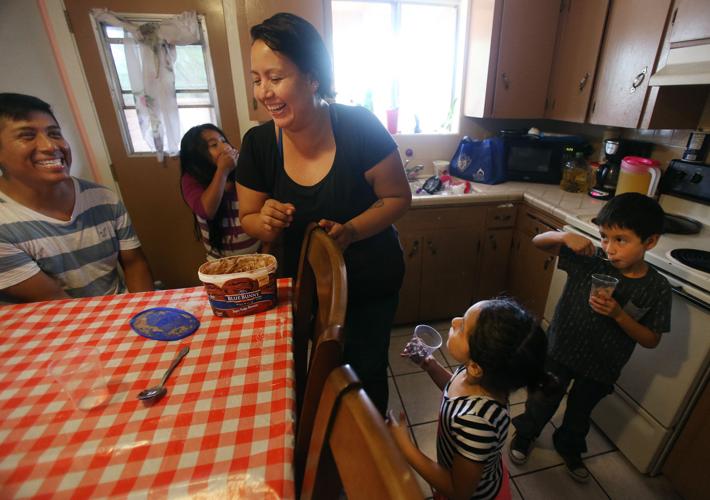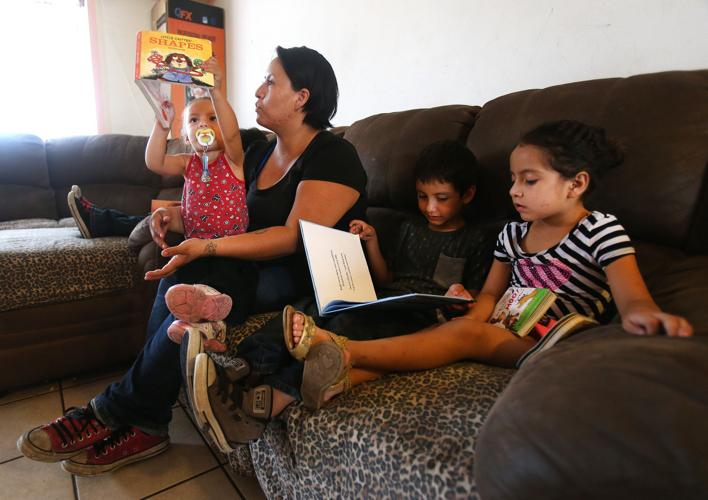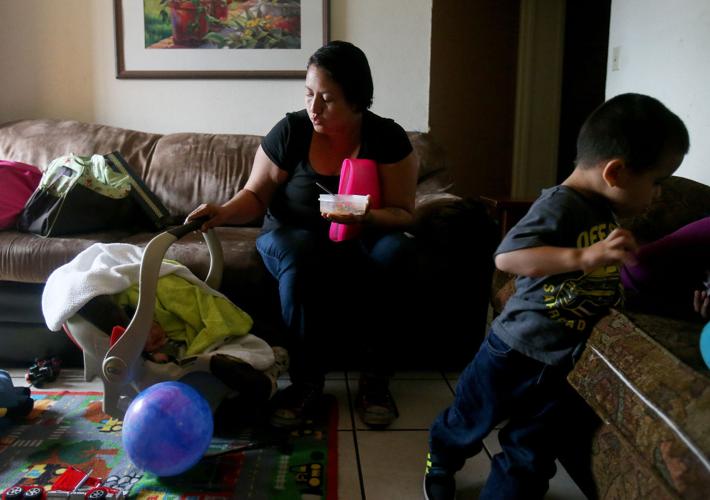When parents in this country illegally are detained or deported, their children often are left behind — and some end up in state custody.
Because of a lack of uniformity across agencies and across states, the outcome of each case depends largely on individual attorneys, caseworkers, judges and even detention centers.
Several efforts intend to change that:
- A local group of juvenile court judges, attorneys, child-welfare caseworkers and Mexican officials are working together to find possible solutions.
- A new agreement designed to help prevent family separation requires Arizona officials to notify the Mexican Consulate of cases involving Mexican children.
- New federal guidance emphasizes that child-welfare agencies train employees to deal with such cases and provide appropriate services to families.
- Grassroots efforts are teaching families how to protect children in case parents are detained.
“It’s beginning to work; the community is waking up to this issue,” said Laurie Melrood, a social worker and consultant with immigrant families who spearheads the state working group. “But we are still figuring it out.”
A series of reports highlighted how difficult it is for parents to get their children back once they are detained or deported. Challenges include communication, ability to participate in court proceedings, access to parenting classes and ability to attend scheduled visitations with their children, found a 2011 study by Nina Rabin, a University of Arizona law professor.
All of these issues manifested themselves in the case of one client. The woman was accused of child abuse because she left her children with her boyfriend, who took his daughters to the park, leaving her disabled 14-year-old son alone in the apartment. After two years of fighting her immigration case, the woman was deported and the state terminated her parental rights.
Rabin said she talked to many experts in the child-welfare system who said that single incident wouldn’t have been the basis for terminating her rights if it weren’t for the prolonged period that the mother was detained and unavailable to parent.
Judges, caseworkers and attorneys reported not knowing how to contact detention centers to look for parents who had been detained or deported, Rabin said. Some would write the parent off out of a belief that if they were detained, they must have done something wrong.
“Everybody in the welfare system talked about the black hole of immigration,” she said.
‘shattered families’
Up to half a million parents were deported from 2009 to 2013, the Urban Institute and the Migration Policy Institute recently reported.
No one tracks how many of their children ended up in foster care or were reported to child-welfare agencies.
One estimate says about 5 percent of all children reported to U.S. child-welfare agencies have a parent who is in the country illegally. The report, published in the Children and Youth Services Review Journal, also found that among Hispanic children, it rises to 19 percent. These figures do not include children who entered foster care.
In 2011, Race Forward, formerly the Applied Research Center, was the first group to try to quantify the problem for its report “Shattered Families.” It found that at least 5,100 children in foster care had a detained or deported parent. That included roughly 275 in Maricopa County and 130 in Pima County.
“We pulled back the veil on the system to show families were being destroyed and systems were not communicating with each other,” said Dominique Apollon, the group’s research director.
The state is required to file a dependency petition within 72 hours of removing a child from the home. But if officials can talk with the parent during this window about potential kinship placements, foster care can be avoided, Melrood said.
Plans can also be made before the parent is deported. Once the parent is outside the United States, caseworkers and attorneys first have to locate the parent, then work with another country that may have different standards for home placements and might not offer the parenting classes and services required by a U.S. child-welfare agency.
The issue goes beyond the impact on children and families. Arizona pays licensed foster parents up to $32.57 a day to care for a child, and more if the child has significant medical needs — and that doesn’t include health care, case management and judicial expenses.
Asking the right questions, including law enforcement checking whether child care has been arranged before calling child-welfare authorities, could prevent about half of the children with a detained or deported parent from going into the system, Melrood said. That is especially important in Arizona, where more than 17,000 children are in out-of-home care and there is a serious shortage of foster homes.
MULTI-AGENCY GROUP WORKS FOR CHANGE, standardization
The Committee to Support Transnational Families met for the first time in April. Juvenile court judges, local representatives from the Department of Child Safety, immigration attorneys, members of the Florence Immigrant and Refugee Rights Project and officials from the Tucson and Nogales Mexican Consulates discussed a protocol to help child-welfare workers make referrals to immigration specialists. The group also planned future trainings for judges and case workers, and discussed a new memorandum of understanding between the consulates in the state and the DCS.
The agreement will standardize the process through which the Mexican government can help locate parents, get documents, make referrals to immigration attorneys, and coordinate with the System for Integral Family Development, or DIF, to make sure a case plan is followed, said Ricardo Pineda, Mexican consul in Tucson. His office is helping with 15 active DCS cases.
“You’ve got two systems working on different sides of the border,” said Santa Cruz County juvenile court Judge Kimberly Corsaro, who serves on the committee. “This transnational group has potential to improve visits across the border, to improve communications regarding the home study.”
STATE, FEDERAL GUIDELINES
State and federal guidelines help officials know what to do when a parent has been detained.
On the state level, DCS doesn’t track the number of children in custody who have a deported or detained parent by ICE, agency spokesman Doug Nick said, because all children are treated the same regardless of the parent’s or their immigration status. But some employees participate in training sessions and serve on committees addressing the issue. The agency recently worked with local stakeholders and immigration officials in Arizona to develop practical guidelines for the juvenile-dependency process related to detained parents.
Nationally, immigration officials are urged to consider whether someone is the primary caretaker of a child when processing a case. ICE said it typically does not detain a parent while an immigration proceeds, but that parent ultimately may still be deported. Recent border-crossers and anyone with a criminal history are a priority for detention.
ICE created an online detainee-locator system, and in 2013 issued a directive to facilitate parent-child visitation in detention centers and for parents to participate in court hearings.
This year, the U.S. Department of Health and Human Services also issued guidance for case planning and for delivering services to families in which a parent is detained or deported. Arizona’s cases are handled with these guidelines in mind, Nick said.
preparing for the worst
Grassroots groups are teaching parents their rights and how to protect their children.
Belem Chagolla joined one of them, Corazón de Tucson, about four years ago.
“We had heard about families who had their children taken away, and we were afraid,” she said.
After attending a meeting, Chagolla spoke to her sister, a permanent resident, about taking care of her four children if anything happened. She gave her sister power of attorney, made copies of all the important documents, and put them in a pink folder.
She also made sure all of her children had dual citizenship in case they had to go live in Mexico.
A guide, “What if I’m picked up by ICE in Arizona,” sits on her TV stand next to the Dr. Seuss books. Created locally by a coalition of experts and advocates, it tells parents about guardianship, the importance of having a plan and what to do if they are stopped.
Chagolla has prepared her oldest son, 8-year-old Diego, for the worst.
“If you see the police take me away, don’t worry,” she told him. “Your aunt is here. She loves you, and she will take care of you.”
This awareness, social worker Melrood said, “makes it easier for kids to not fall through the cracks or end up in foster care.”
But for every family that has a plan, she said, many more don’t.
“We want to reach out to more families,” said Monica Velasco, Chagolla’s neighbor and also a member of Corazón de Tucson.
“Every time I meet a mother, I ask her, ‘Do you know about the guardianship?’” Velasco is starting a women’s group to talk about these issues.
The women haven’t heard of recent cases where DCS took custody of children whose parents were stopped by the police, and for that they credit the contingency plans and more awareness by police officers.
OUTREACH IN MEXICO
The education process is happening on both sides of the border.
Melrood organizes trips to Nogales with judges, attorneys and social workers to meet with the DIF and migrants.
There also are plans to train the DIF on how Arizona’s child-welfare system works, what a home study looks like here and what the requirements of case plans are.
Frida Espinosa, a former Arizona resident who is the transnational family support coordinator with the Institute for Women in Migration in Mexico City, is working on a practical guide for the DIF about how to work with transnational families. She also created videos for deported parents. Her organization invited a group of stakeholders from Tucson to give a presentation in Mexico about local efforts. Strides have been made, but advocates continue to push for a uniform policy for better data collection to ensure these families’ needs are being met, Melrood said, including case plans they can comply with.
“We want to see significant reductions in the number of children of detained parents going into state custody just because no one knew how to find the parents or work with extended family,” she said.







